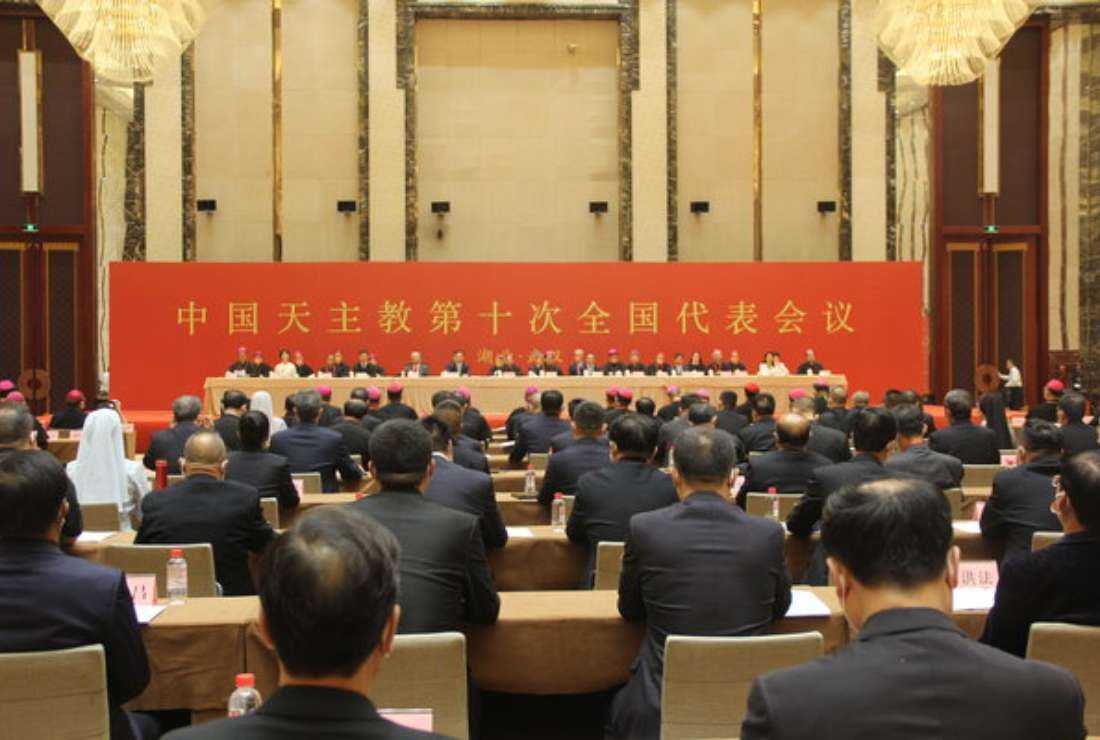
Catholic bishops, priests and religious from across China have started a state-sponsored once-in-five years national conference in the presence of Chinese Communist Party (CCP) officials, stressing the importance of adhering to government policies on religious affairs and strengthening patriotism.
The 10th National Congress of Catholicism in China began in Wuhan, the capital of Hubei Province in central China on Aug. 18, says a notice on the website of the state-run Bishops Conference of the Catholic Church in China (BCCCC).
Some 345 Catholic bishops, priests, and religions representing 28 provinces, autonomous regions, and municipalities are attending the three-day assembly.
Among the state officials attending are Cui Maohu, deputy minister of the United Front Work Department of the CCP Central Committee and Director of the State Administration of Religious Affairs, and Ning Yong, a member of the Standing Committee of the CCP Hubei Provincial Committee and Minister of the United Front Work Department.
Both Cui and Ning attended the opening ceremony and delivered speeches.
In his address, Cui said the government fully affirms various activities of the BCCCC and Chinese Catholic Patriotic Association (CCPA) over the past six years that highlighted commitments and love for the nation and allegiance to the party leadership.
He pointed out that since the 9th National Congress in 2016 in Beijing, Chinese Catholics have strengthened their ideological and political leadership, adhered to the road of independent and self-run churches, further promoted the construction of Chinese theological ideas, and focused on cultivating patriotism.
Cui said Chinese Catholics “love teaching and church talents, vigorously carry out social service undertakings, attach importance to strengthening self-construction, and have achieved remarkable results in various work.”
Archbishop Joseph Li Shan of Beijing, Bishop Joseph Shen Bin of Hamien, and Bishop Joseph Guo Jincai of Hebei delivered speeches during the opening ceremony of the conference.
Bishop Huang Bingzhang Huang of Shantou Diocese presented a report explaining the recent revision of the CCPA’s “One Council, One Mission” constitution to align with priorities set by President Xi Jinping
Deputy minister Cui emphasized that Chinese Catholics should “earnestly study” and implement Xi’s “important expositions on religious work” to adhere to the principle of independent and self-run churches, hold high patriotism and love for religion, and actively promote the process of sinicizing Catholicism in China.
Academically, sinicization of religion refers to the indigenization of religious faith, practice and ritual in Chinese culture and society, according to the Lausanne Movement.
However, the CCP advances sinicization as a profoundly political ideology that aims to impose strict rules on societies and institutions based on the core values of socialism, autonomy, and supporting the leadership of the CCP.
In his speech, Bishop Shen Bin said that the Chinese Catholic Church has always adhered to the correct political direction, led the majority of priests, elders, and faithful across the country to hold high patriotism and love for religion, and built a solid foundation for independent and self-run churches.
By promoting the sinicization of Catholicism in China, Bishop Shen said, the Church can carry out effective catechism, advance the cause of pastoral evangelization, actively participate in social welfare and charity, and write a “new chapter for the Chinese Church.”
Bishop Shen said that in the next five years, Chinese Catholics will fully implement the spirit of the National Conference on Religious Affairs held last December.
During that conference on Dec. 3-4, President Xi stressed the strict implementation of Marxist policies, increased online surveillance, and tightening control of religion to ensure national security.
Officially atheist Communist China recognizes the legal presence of five religions — Buddhism, Taoism, Islam, Catholicism, and Protestantism.
All religious groups are required to be registered with the government and strictly follow regulations set out for state-sanctioned organizations. Any violation of rules and policies triggers crackdowns, arrests, and the shuttering of religious groups and activities by the state.
China severed diplomatic ties with the Vatican following the communist takeover in 1949.
Following the first National Congress of Catholicism in China in 1957, the government formed the CCPA, to control the Catholic Church, while the underground Catholics continued to pledge allegiance to the pope and the universal Church.
Independent researchers noted that China has about 12 million Catholics split between patriotic and underground churches.
The 2018 Sino-Vatican Agreement was signed and renewed in 2020, to end the dispute between the Vatican and Beijing over the appointment of Catholic bishops.
